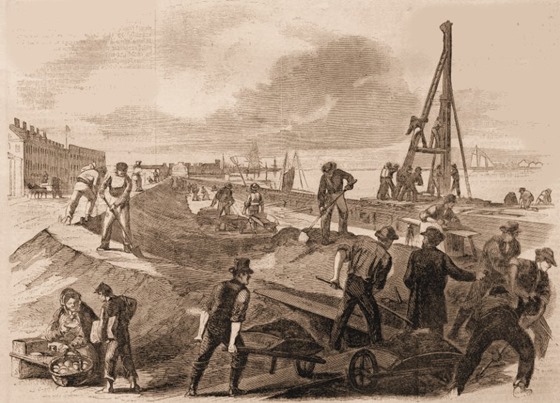March 1st [1863]. Beautifully clear—rather cold; trees all in bud and the squares opposite emerald green and glittering. Mary Harrison, Ella, Sissie and Ally, their brother, called on their way to church. Didn’t go with them. Stopped on their way back and waited for the car—told us of the welcome to Confederates in Lexington, Ky., and showed us a likeness of Kirby Smith, which had arrived in a letter from that city. Smith looks like the earnest, brave and pious soldier which report speaks him. This likeness is somewhat faded, having been sunk on the Ella Warley on her way from New York and recovered. Two bags of letters have been fished up. We, Ginnie and I, cannot help hoping that the one granting a power of attorney to the Campos family, which will enable them to pay us, is amongst the rescued. It seems that the common thread must mingle with that which Lachesis lengthens and Atropos severs. What life and life interests must have gone down on the Ella Warley. Mrs. Roselius came in the evening with Mr. Denman, a Yankee, but a Southern one. Butler’s arrival in New York, he says, created no sensation. His arrival was not published. The flaming accounts we had read here of his magnificent reception, were little more than advertisements of a non-existing greatness, paid for by Butler himself. This wretch, it seems, is in favor with none but the vile Abolitionists. They continuously talk of sending him to Charleston, or back to this city. Charleston is not taken yet—never will be—and we don’t believe Butler would risk meeting the 290 on his way here. I was sorry when I heard he had been made much of at the North. For I am humanitarian enough, and Christian enough, I hope, to wish to see a respect for right, purity and justice even among enemies. No man who had respect for himself, honesty, truthfulness, bravery or kindness to women would take Butler by the hand. The cause of humanity is served, I think, when such brutes meet their deserts—universal contempt.
The Federal army is rich in brutes and brute force. Mr. Denman gave a description of a visit of Stafford (the general of the negroes) to the bank last summer. He came in with a shinplaster, and with a horrible oath told one of the bank gentlemen to pay the amount in gold. On being told that there was no gold, but that small notes would be issued soon, he swore terribly, drew his sword and flourished it in the wildest manner, threatening to cut their heads off. Mr. D____ owned that he was as afraid of him as he would be of a horned devil. “I’se got your Mayor down to Fort Jackson,” said Stafford, grinding his teeth, “where I hope the mosquitoes will eat out his d____d heart.” And more of this sort. The banker looked at the note and found it one of the coffee-house issues, with which the city last spring was flooded, and which Butler (very properly) had ordered to be redeemed, said he: “This is not our note; we have nothing to do with it,” whereupon, Stafford took it up and turned round upon a crowd of women and children who had followed him into the bank, flourishing his sword over them and swearing at them. This creature is below the city, having in command 1,400 negroes, armed and equipped, wearing the leather belt which other soldiers wear, having the letters U. S. in brass upon it. The once honored “Stars and Stripes” can be borne by such hands as these. Many of the negroes in camp having yielded to temptation, and been beguiled by Yankee falsehoods into running away from their masters, now that they realize their position, wish to return to them. But Stafford refuses to allow them to go home. We, against whom these poor creatures are arrayed, have no fear of them, at least as soldiers. They will fly at the first fire. Stafford, with his band, have been committing depredations in the country, but their gallant efforts have been confined to house-breaking, house-burning, chicken, horse and cattle stealing, and impudence to white people. Nothing more clearly defines the subordinate position, or the real justice of their position, more than their total want of social virtues. They are never true to each other, either in friendship or love. And even the maternal tie is not strong with them. Last spring, when the Yankees came, and even before then, many persons had gone into the country with their house servants, very often leaving behind husbands or wives in the Confederacy. I know of many instances where such interest was taken by their owners that they have written or sent for servants so situated, but in not one case have I known one to go. A life of lounging round the streets, feeding at the expense of the United States Government, has proved more enticing than the memories of wife or child. They have mostly gotten new mates. Mrs. Norton, in letters from her family and friends, is often charged with messages to servants who do not even wish to hear from those that are gone. I was once an Abolitionist, and resented for this race’s sake their position in the awful scale of humanity. But, I verily believe, that negroes are not now developed creatures. What they may be sometime I can not prognosticate, but I do believe in the law of progress. I call to mind the age when Britons wore skins, and hope for all things.











